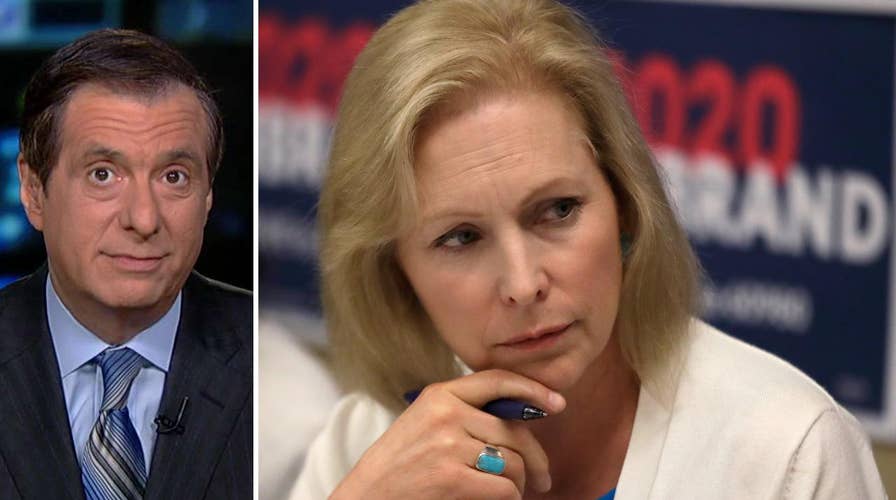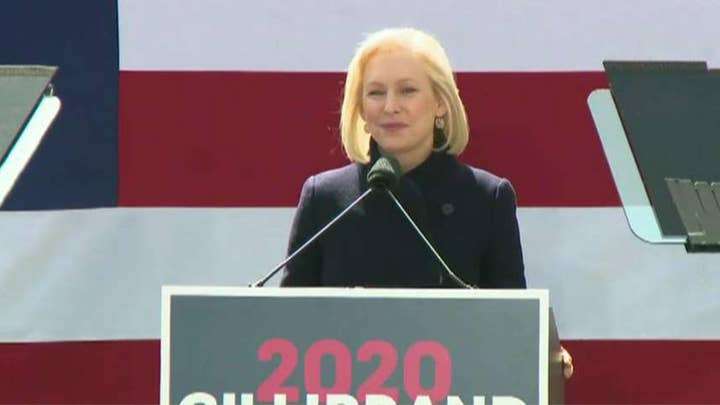Howard Kurtz: It's about time: Debate rules are shrinking Democratic field
'MediaBuzz' host Howard Kurtz weighs in on how the DNC is forcing Kirsten Gillibrand and other candidates out of the presidential race.
Kirsten Gillibrand and other candidates are essentially being forced out of the race by Democratic leaders.
And that’s not necessarily a bad thing.
The field has been too swollen in a way that creates overcrowded debate stages and muffles the message of all but the top few contenders. A party would be insane not to try to winnow the competition to those who actually have a shot at the nomination.
Gillibrand was upfront in saying she’s dropping out because she didn’t make the cut for what will now be next month’s single ABC debate in Houston. Losing that visibility makes a viable candidacy all but impossible.
PUNDITS PROCLAIM TRUMP FATIGUE, BUT IS AMERICA REALLY TIRING OF POTUS?
The field, which once numbered two dozen, has already lost Eric Swalwell, Seth Moulton, Jay Inslee and John Hickenlooper.
Others who didn’t make the debate cut—such as Colorado Sen. Michael Bennet, Montana Gov. Steve Bullock, New York Mayor Bill de Blasio and Hawaii Rep. Tulsi Gabbard—are still hanging on. By a thread, I’d say.
As former DNC official Mo Elleithee, a Fox News contributor, told the New York Times:
“If you are a few months before the Iowa caucuses and you can’t get 130,000 donors and can’t crack 2 percent in a couple of polls, that’s on you. There is an appetite to start being able to focus on the candidates who have demonstrated the most movement in this race.”
Some of those beyond the 10 candidates who will be on the Houston stage are grumbling about the Democratic Party pushing out credible politicians before they have a chance to get traction in, say, Iowa or New Hampshire. But if after several months you’re behind Andrew Yang (who did make the cut), you’re going nowhere fast.
Some people in both parties run for president as a branding exercise, to get a book deal or a cable gig, knowing they have no real prospect of winning. Look how many profiles of Marianne Williamson you’ve had to read.
SUBSCRIBE TO HOWIE'S MEDIA BUZZMETER PODCAST, A RIFF OF THE DAY'S HOTTEST STORIES
But Gillibrand is an incumbent senator who hoped she might catch fire by putting women’s issues at the top of her agenda. It didn’t work. The New York lawmaker never broke through the static.
Some, like Rachel Maddow, hailed her mere presence in the race, along with that of Elizabeth Warren, Kamala Harris, and the other female candidates, as a gender breakthrough. And it’s good that a single woman no longer has to carry that burden.
But Gillibrand herself blamed her low poll numbers on sexism, telling CNN a few months ago: “I think people are generally biased against women.”
How then to explain Warren’s surge in the polls? Gillibrand also said in that interview that there’s bias against “younger women.”
The Washington Post Magazine recently assessed her struggling candidacy with this headline: “In 2019 It’s Unforgivable for a Presidential Candidate to be Boring.”
I’m not saying Gillibrand was deadly dull, but she never quite had a moment, on the stump or in the first two debates, where she said something that was noteworthy or controversial enough to get voters to take a closer look. I mean, she never even got a Trump nickname, although he did tweet sarcastically about her exit.
The Post piece put it this way: “Maybe it’s that her recalibration on guns and immigration is often framed as pandering. Maybe it’s because her role in Al Franken’s Senate resignation has been cast as inconvenient for Democrats and convenient for her. Maybe it’s sexism: The careful, methodical journey to the presidency seems to read as a natural expression of ambition for the charismatics sweating through oxfords under stadium lights, but somehow feels forced when paired with a blowout.”
Maybe.
But look at how Pete Buttigieg managed to catapult himself into serious contention with a series of provocative interviews and speeches. When you think of the woman who was first appointed to Hillary Clinton’s Senate seat, no personal quality comes to mind, no issue beyond her crusade against sexual harassment, and that wasn’t enough.
Now that the DNC is forcibly shrinking the field, voters—and the media—can focus more intently on those who might actually win the nomination. Gillibrand told the Times that a woman nominee would be “exciting and inspiring,” but didn’t rule out endorsing anyone who could beat Donald Trump.


